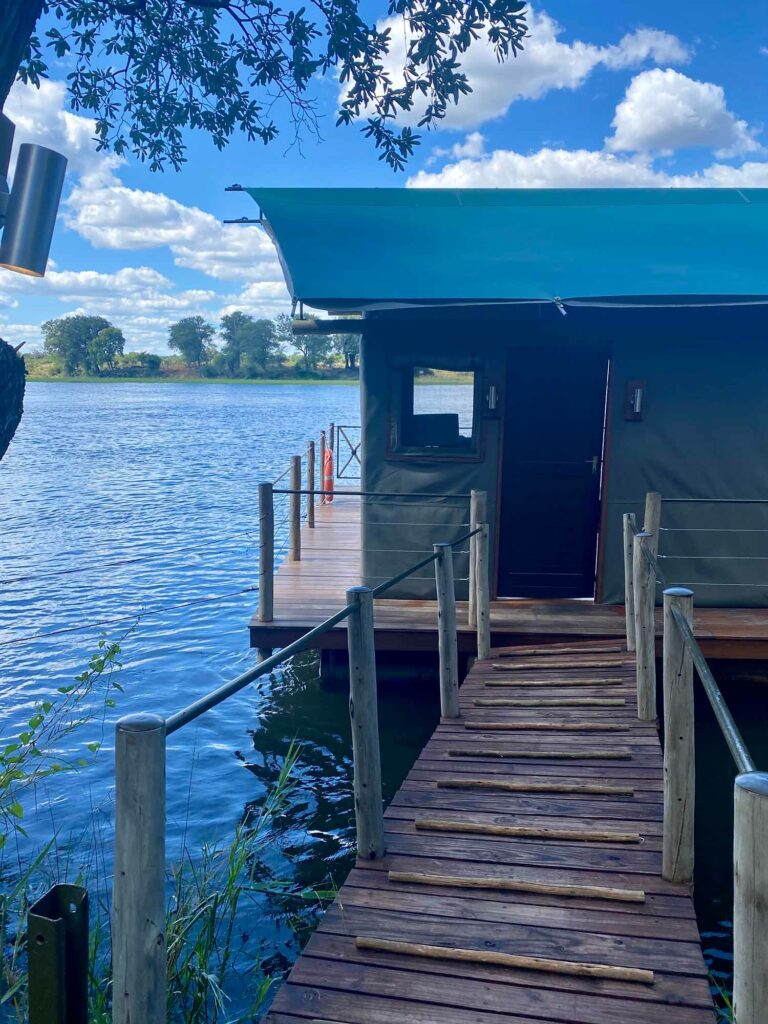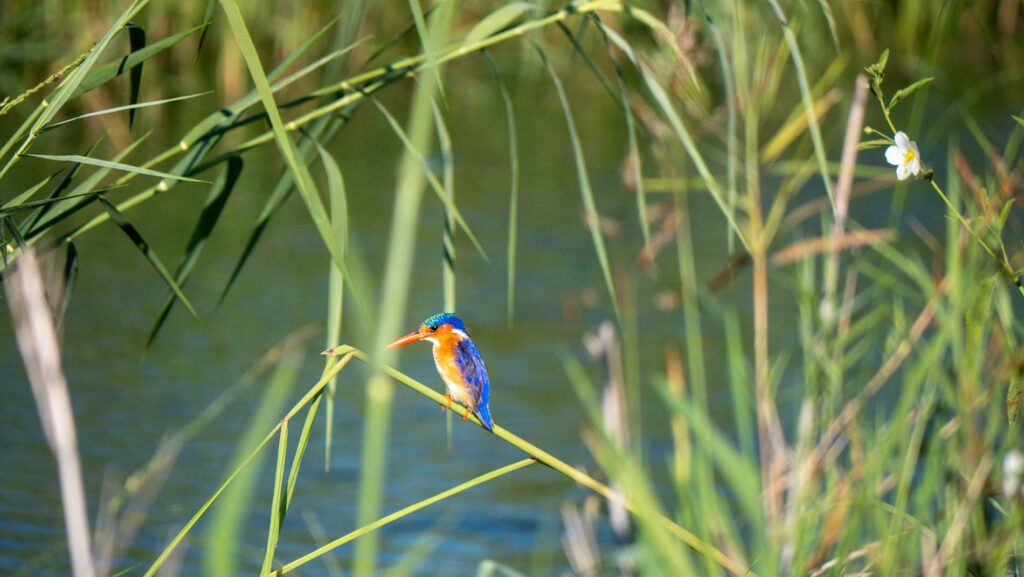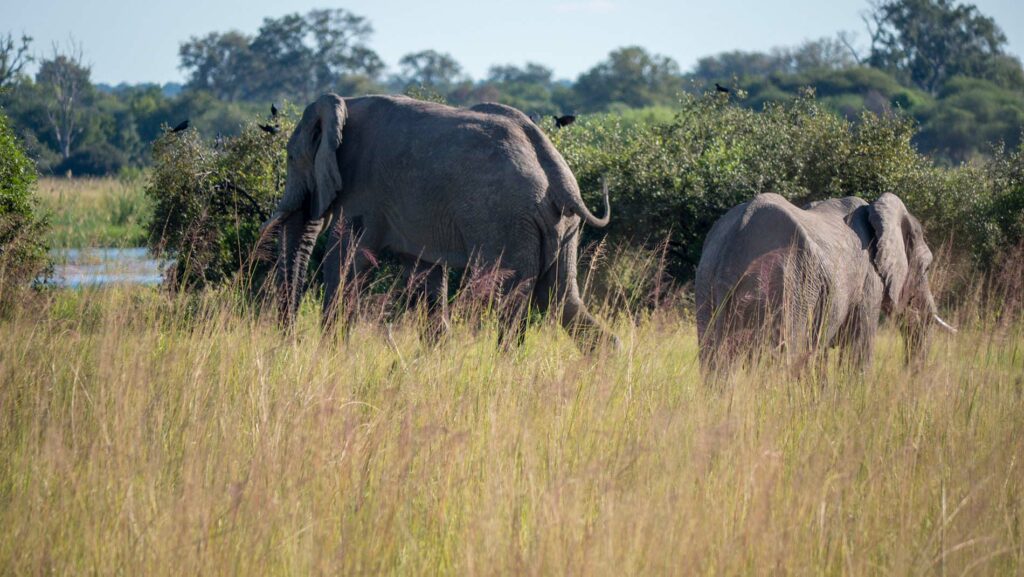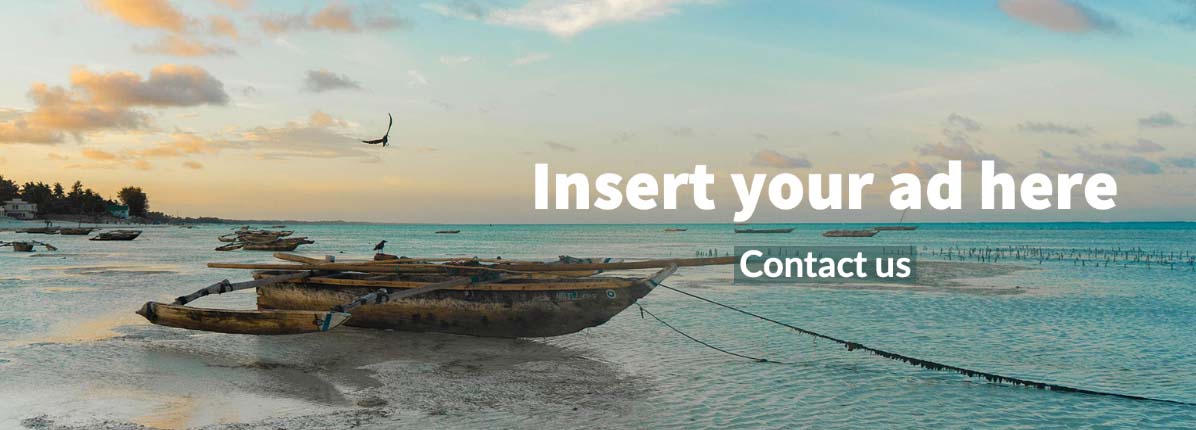Those who think that Namibia only has desert landscapes are wrong. The country has much more to offer, such as swamps, grasslands, rivers, and the green parks of the Kavango region (named after its inhabitants). However, most tourists skip this area during their tours and prefer to visit neighbouring Botswana. But why? “This is the most underrated part of Namibia. The swamps, animals, and vegetation are the same as in Botswana, but here, we offer you a much better price”, says Ralph, former wildlife guide and one of the owners of the Ndhovu Lodge since 2019.
Personal relationships
Elephants have a special ability to form personal relationships. They live in herds, in families. At Ndhovu Lodge – which means ‘elephant’ in the local language – it’s no different. Here too, personal relationships are central. Anyone who wants to learn more about the Kavango region, its people and history, only has to sit down at the long family dinner table to hear all kinds of impressive stories.
Article continues below.

Ndhovu Lodge River Suite
We stay in the lodge’s new river suite: a luxuriously furnished houseboat. Upon entering, we immediately notice the view of the Okovango River. Right next to the lodge is a hippo pool where, in the dry season, about 20 these impressive animals live together. Crocodiles can also be found frequently in the river. On the covered terrace of the suite are luxurious chairs, where you can sit for hours and gaze at the other side. You look directly out over the banks of the Buffalo Game Area: a favourite watering place for many wild animals. “Buffalo, elephants, lions, impalas, kudus: they all walk by here on the other side”, says Ralph. In the houseboat, you can even watch them from your bed. Or for the enthusiast: from a warm bath, while enjoying a glass of wine. “The elephants even cross over to this side of the river from time to time.”
Buffalo Game Park
At the end of the afternoon, we sail to the other side of the river where our guide Bonifatius awaits us with the open safari car to discover the Buffalo-Area. The park is part of the Kavango-Zambezi Transfrontier Conservation Area (KAZA), a joint organisation between Namibia, Angola, Zambia, Zimbabwe, and Botswana. In total, the area is almost twice the size of the United Kingdom. There are no fences anywhere, which means that the animals can move around freely.
We’ve only just arrived in the park with Bonifatius when we see a herd of buffalo bulls pass by. The scene evokes memories of the great migration, right in front of our eyes. It’s certainly impressive. We visit the park at the end of the wet season. The water level in the river is high, which means that the grasslands and some roads are flooded. There are lilies in the water everywhere, and we count dozens of bird species, antelopes, boars, and kudus. However, the grass is high and the bushes are dense at this time of year, which can make it more difficult to see lions, leopards, and elephants. But Bonifatius knows what to look for and peers into the sand to find animal tracks. “I learned this from my parents, who used to have to hunt for their food”, he says. That’s no longer allowed now, but the knowledge about tracks comes in handy for the guide. “Hunters know the most about tracks. I can notice immediately if a track is fresh. If it’s about half an hour old, it’s worth following. Like these elephant prints,” he says, pointing to the large round paw prints. Indeed, the elephants and lions are not far away.
Article continues below.

Villa Breytenbach
Besides the rich wildlife, what makes Buffalo Park special is its turbulent history. Driving through the park, we come across a dilapidated army base of the South African army: Villa Breytenbach. “During the civil war in Angola, the colonial ruler of Namibia at the time was South Africa. People feared that the rebellion would spread to Namibia, and so soldiers were stationed here”, Ralph explains. The former army base is completely deserted, and nature is slowly taking over. Trees grow out of the dilapidated buildings, the concrete is slowly rotting away, and climbing plants overgrow the remaining walls. Where soldiers once prepared themselves to fight rebels, now only kudus and springboks walk around.
Elephants in the area suffered from deep war traumas, which were passed on through generations. It took years before they dared to walk into Angola again. “They just stopped at the border, and then turned around. They still felt the danger after all these years. Thankfully, things are better now”, says co-owner Claus. The memories of the past are slowly fading away.
Article continues below.

Large family table
Back at the lodge, we meet Henriette at the long family table for dinner. She’s camping at the lodge and has been travelling on her own by motorbike through Africa for a year and eight months. She loves to tell us about her adventures. One extraordinary travel anecdote follows after the other: “Sometimes, I came across up to 15 elephants by the side of the road, all while I was on my motorbike”, she says. “And once in South Africa, I was riding alone in a totally deserted area when my bike got stuck in the mud, and I had to go find help on foot.”
The fact that the lodge means a lot to the neighbouring village shows that personal contact extends beyond the dinner table. “Who else would take care of these people?”, says Ralph. “We don’t have to become millionaires, so we help where we can.” For example, the lodge is building a school for the village, and Ndhovu has provided a tank of filtered water. “In this way, the people no longer have to fetch water from the river, which is dangerous with all those crocodiles and hippos around.” It’s a welcome gift: “The tank contains 2500 litres of water, and it’s empty at the end of every day”.
Permission of the local king
“We’re the ones using their land, so we’re happy to give back”, he says. In this region, it’s impossible to buy land: all land belongs to the community. Anyone who wants to do something here needs permission from the village and from the local king: the fumu. “Together with the village elder, we visited him when we wanted to take over the lodge”, says Claus. “He lives in a large stone house with a garden, his palace. We met the fumu in his garden, where he sat on his throne under a big tree.” It was quite the experience. “Only after he claps his hands three times are you allowed to sit down to tell him about your plans.” Without the permission of the local king, your chances are lost anyway, as it’d make it impossible to get a permit from the government. Fortunately, the fumu was kind to Ralph and Claus, and since then, they’ve turned Ndhovu into a place where you feel at home as a guest. It’s an excellent place to explore the Kavango region from.
Review Ndhovu Lodge
Location: wonderful. The river suite offers a great view of the river and wildlife.
Service & facilities: excellent.
Rooms: apart from the attractive river suites, it’s also possible to stay in a safari tent or on the campsite.
Disabled accessibility: no.
Note: Ndhovu feels like a luxury version of a hostel thanks to all the personal conversations with staff and guests. It offers all the joys of meeting new people, without the burdens of a bad mattress and noisy neighbours. On the contrary, waking up in the river suite is certainly a unique experience.
You can stay in the river suite from $343 a night. You can book directly via the website of the accommodation. You can also book an overnight stay as part of your tour through Namibia at About Africa Safaris. Our stay was made possible by the Namibia Tourism Board and About Africa Safaris.


Recent Comments